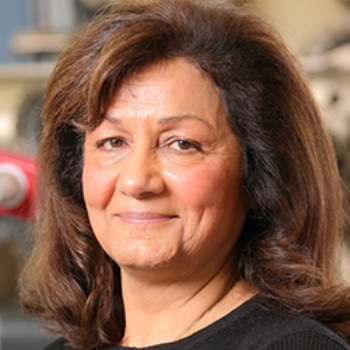Jul 27 2016
With a growing number of people connecting to the Internet everyday, Internet cables are under the threat of a "bandwidth explosion."
 Manijeh Razeghi (Credit: Northwestern University)
Manijeh Razeghi (Credit: Northwestern University)
Free-space optical (FSO) communication is a promising candidate to lighten the load. FSO uses visible or infrared light to wirelessly transmit data through open air as opposed to using cables, which have limited bandwidth. The new technology provides a low-cost and low-power alternative to traditional radio-frequency wireless data links.
"The current state-of-the-art in FSO communications is based around near-infrared sources and photodetectors," said Northwestern University's Manijeh Razeghi. "Unfortunately, using these wavelengths come with major problems."
At high power, near-infrared wavelengths can damage the human eye, and they are hampered by atmospheric scattering and absorption. Razeghi, who leads Northwestern's Center for Quantum Devices, has bypassed this issue by using mid-wavelength infrared radiation, which can benignly and flawlessly transmit through fog, smoke, and clouds.
Razeghi and her team have developed an extremely sensitive mid-wavelength infrared photodetector that has potential to replace near-infrared FSO communications links in many applications. Called a phototransistor, the novel device is a combination of an electronic transistor and optoelectronic photodiode.
On July 12, the research was published online in Applied Physics Letters. Abbas Haddadi, a postdoctoral fellow in Razeghi's laboratory, was first author of the paper.
"For the first time, we have demonstrated a phototransistor that is totally made of an artificial semiconductor," said Razeghi, Walter P. Murphy Professor of Electrical Engineering and Computer Science in Northwestern's McCormick School of Engineering. "This extremely sensitive device could be a game changer for FSO communication technology by providing low-cost, high-speed data links."
Source: http://www.mccormick.northwestern.edu/